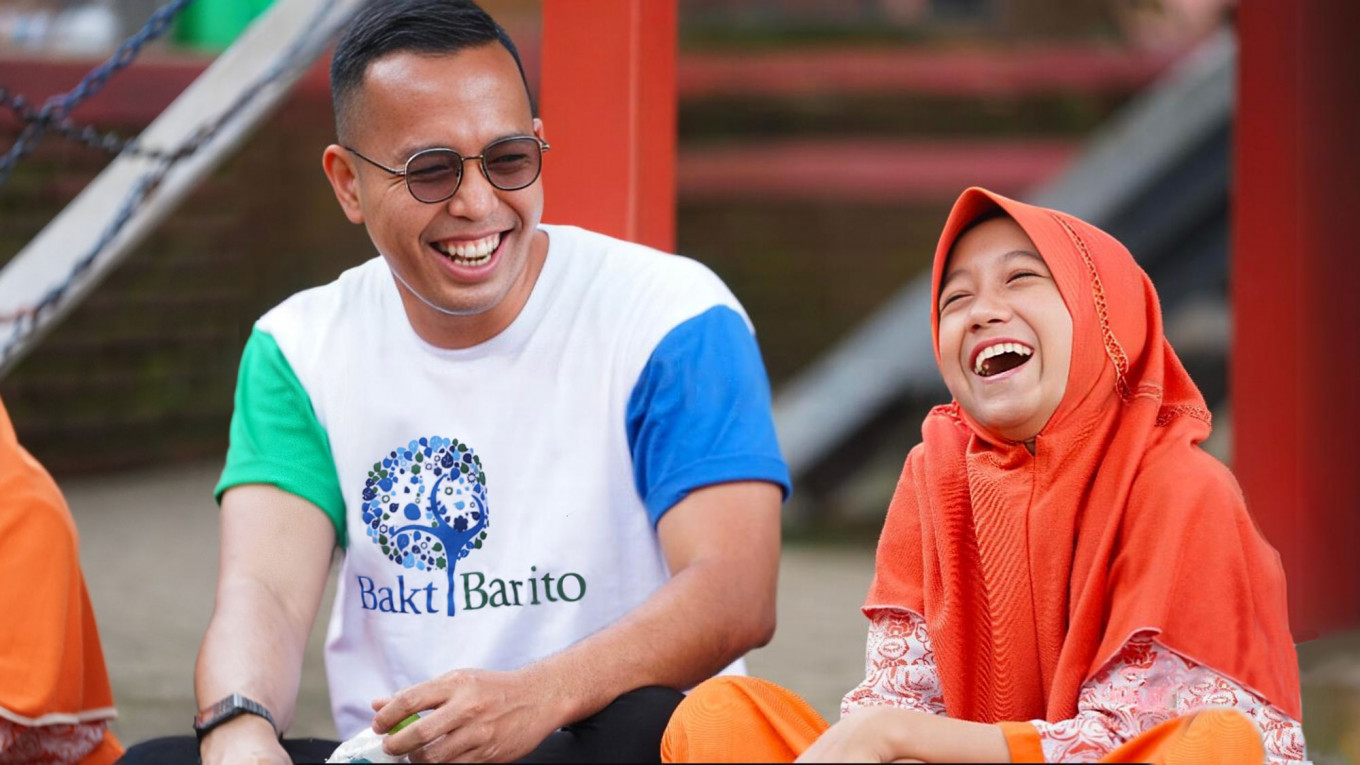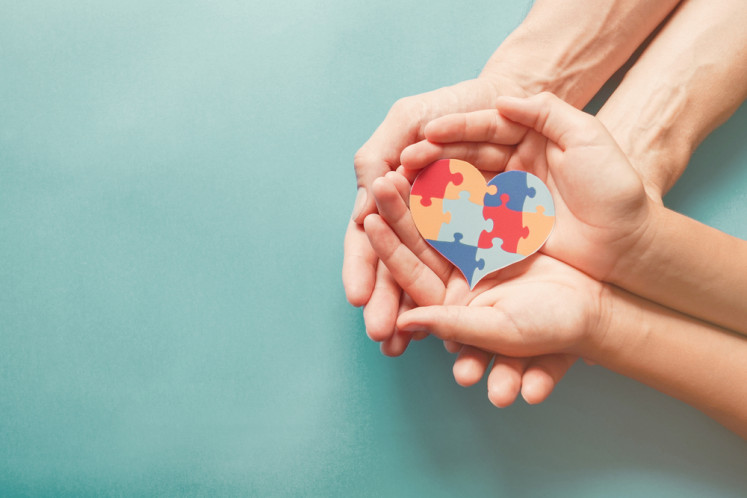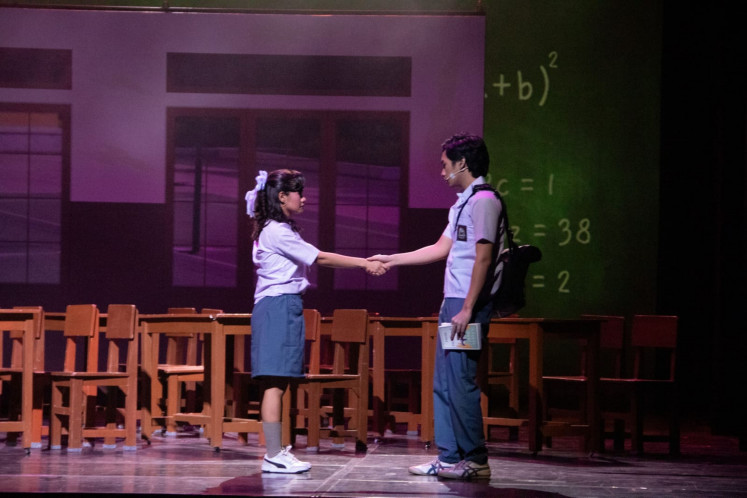Popular Reads
Top Results
Can't find what you're looking for?
View all search resultsPopular Reads
Top Results
Can't find what you're looking for?
View all search resultsAre we forgetting to teach our kids about climate change, and is it too late?
She peeked into the headteacher’s office at her school in Garut regency, West Java, and positioned herself outside next to the waste bins.
Change text size
Gift Premium Articles
to Anyone
S
he peeked into the headteacher’s office at her school in Garut regency, West Java, and positioned herself outside next to the waste bins. Raisya Salsabila was a bright girl, small for her age, but her inquisitive nature seemed larger still. In front of her sat the headteacher, motioning for her to come inside. Raisya perched on the sturdy wooden chair that was slightly too tall for her, sitting quietly with her legs swinging beneath her.
It was 9:43 a.m. on Sept. 25, in the middle of recess. In the next 9 minutes, as the headteacher was being photographed, 16 kids had gathered. All of them wore white and red elementary school uniforms. State elementary school (SD) 2 Karyamekar was one of many schools participating in the Indonesian government's national Adiwiyata program, one of the key educational programs aimed at promoting knowledge and awareness about environmental conservation efforts among school communities. These were mostly the children of low-income farmers.
On that day, there was another option for parents to consider – an Adiwiyata-certified school. SD 2 Karyamekar, an unassuming elementary school in Garut regency, had earned the prestigious Adiwiyata award, meeting criteria such as composting, greenhouse building, plastic recycling facilities and sustainability learning modules.
Gamunah, headteacher at SD 2 Karyamekar, was being photographed by the Bakti Barito Foundation in recognition of her hard work. Gamunah graciously accepted the Adiwiyata award, her hand bashfully placed over her heart as she said Alhamdullilah.
Bakti Barito Foundation had assisted the school in implementing the environmental program, but the question remained: is teaching kids about the environment and climate change in schools effective in bringing about real, systemic change and if so, would it continue to spread?
"At the beginning," Gamunah said, "I was solely focused on obtaining the [Adiwiyata] award. I wasn't paying attention to the larger impact."
Achieving the award was all-consuming, mentally and physically, but Gamunah saw the logistics as part of her job, and her aspirations for the future of her school were unlimited. What she was primarily concerned about, Gamunah said, was educating the kids: "When you run a school, you lead the way; you're creating a new path."
No one could predict the outcome, but the young student sitting next to her had convinced her parents to start recycling and set up an at-home organic waste management system.
Rani Nur Hanifah, Raisya's mother, was asked the question, how had Raisya influenced her to make changes in waste management at home?
"Raisya has been a significant influence on me. I had never considered separating my waste before," Rani said as she sipped a tea. "But now I give her plastic bottles, which she takes to school,"
She smiled.
" ... I let her keep the money she earns from it."
This example demonstrates how children can be powerful agents of change within their households, influencing family behaviors such as plastic recycling, energy conservation, waste reduction and sustainable consumption.
Part of Raisya's curriculum had been created by the Bakti Barito Foundation as a showcase of behavioral change, education and priorities – along with an understanding of the urgent need for learning modules on recycling plastic, disaster mitigation and at-home waste management systems.
In an effort to reach all Indonesian schools, not just those participating in the Adiwiyata program, the government has nationalized the Bakti Barito Foundation’s online learning modules and integrated them into the curriculum.
Elis Nurmawati, Raisya's school teacher from SD 2 Karyamekar, was asked: what did she think would happen at home if every child in Indonesia had access to environmental education?
"Let's assume," Elis said, "that all children learn the basics of tree planting, recycling and efficient energy consumption. I'm still not sure that parents would be willing to change; they tend to be stubborn and set in their ways, especially older generations. But if the kids are enthusiastic and persistent about it, out of 600 kids, my guess is that one or two parents would be willing to recognize the value of starting to recycle."
So, do you think it's important to educate children about climate change and environmental issues such as plastic waste?
"Oh, most definitely."
As it happens, we at Bakti Barito Foundation have conducted a survey and collected data. Here's what we found.
The community's response was unprecedented. Our data show that we collected 2,936 kilograms of plastic waste from all 25 Adiwiyata schools in just two years. This year alone, we hosted 25 workshops on waste management through our Learning Centers in Garut. These workshops are accessible to communities surrounding the Adiwiyata schools and it is usually parents in attendance.
Parents and teachers overwhelmingly responded positively to the benefits of environmental literacy, including promoting critical and creative thinking skills, inspiring children to be more engaged with their communities and helping children develop sustainable habits they will maintain as they grow up.
As a corporate foundation continuing the philanthropic legacy of our founders, the Bakti Barito Foundation creates a network of support and drives collective action between the local government, communities and businesses. For this Adiwiyata program specifically, we partner with the Environment and Forestry Ministry, Education, Culture, Research and Technology Ministry, Public Works and Housing Ministry and local recycling centers.
"Dumping waste into a giant pile is a terrible way to manage waste," said Jujun Juansyah Nurhakim, head of the Environment Department in Garut. "It's urgent for us to implement programs specifically about sorting waste at the source, and kids are the perfect messengers for change."
At Bakti Barito Foundation, we aim to inspire our children to protect the planet and become the green guardians of tomorrow.
Since 2021, Bakti Barito Foundation has implemented environmental education in elementary schools across Java in support of the national Adiwiyata-school program. Visit our website baktibarito.com to learn more about our programs.
In partnership with: Yayasan Bakti Barito.











